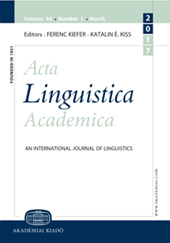A direct comparison of metonymic and metaphoric relations in adjective–noun pairs
A direct comparison of metonymic and metaphoric relations in adjective–noun pairs
Author(s): Hanna Weiland-Breckle, Petra B. SchumacherSubject(s): Semantics
Published by: Akadémiai Kiadó
Keywords: metonymy; metaphor; adjectives; N400; experimental pragmatics
Summary/Abstract: Theories on metaphor and metonymy make different claims about the nature of the underlying processes in the computation of these two types of language use, i.e., whether they differ or not. Experimental investigations of metonymy and metaphor have generally not compared these two phenomena in a straightforward manner among others due to structural variability. To overcome this shortcoming, we conducted a study in German that used adjective–noun combinations to contrast metaphor and metonymy directly in an ERP-study during reading for comprehension. By combining three different nouns with one adjective in predicative position we construed adjective–noun pairs with literal (the baby was lively), metonymic (the eyes were lively) or metaphoric (the speed was lively) relations. The data revealed a more pronounced N400 for the metaphoric relations in comparison to the literal controls. We argue that the enhanced cost for metaphors reflects the activation process of two unrelated domains via mapping or extended predication. The metonymic adjective–noun pairs only showed a small trend to differ from the other two conditions. This might indicate that metonymies require mapping processes or shifts only within a single domain or domain matrix. Moreover, in contrast to previous studies, we did not find a Late Positivity. We explain this result with regard to different discourse representational consequences arising during combinatorial processing.
- Issue Year: 65/2018
- Issue No: 2-3
- Page Range: 443-472
- Page Count: 30
- Language: English
- Content File-PDF

